--- Journalist, Grazier, Land agent, Politician, Senator, Cabinet Minister, Husband, Father, Grandfather, Patriot and Friend to Australia’s Soldiers ---

Signature of Edward Davis Millen. Image taken from the first edition of ‘Repatriation’ the official journal of the Repatriation Department, Vol. 1, No. 1 (March 1919). Courtesy of Trove.
[Lead image: Portrait photograph of then Senator and Minister for Defence, Edward Davis Millen, c. 1914. Courtesy of the Australian War Memorial (306782).]
Birth and Early Life
Edward Davis Millen was born on 7 November 1860 in Deal, Kent, England. His parents were John Bullock and Charlotte MILLEN (nee DAVIS), and he was the fourth of eight children born to the couple.
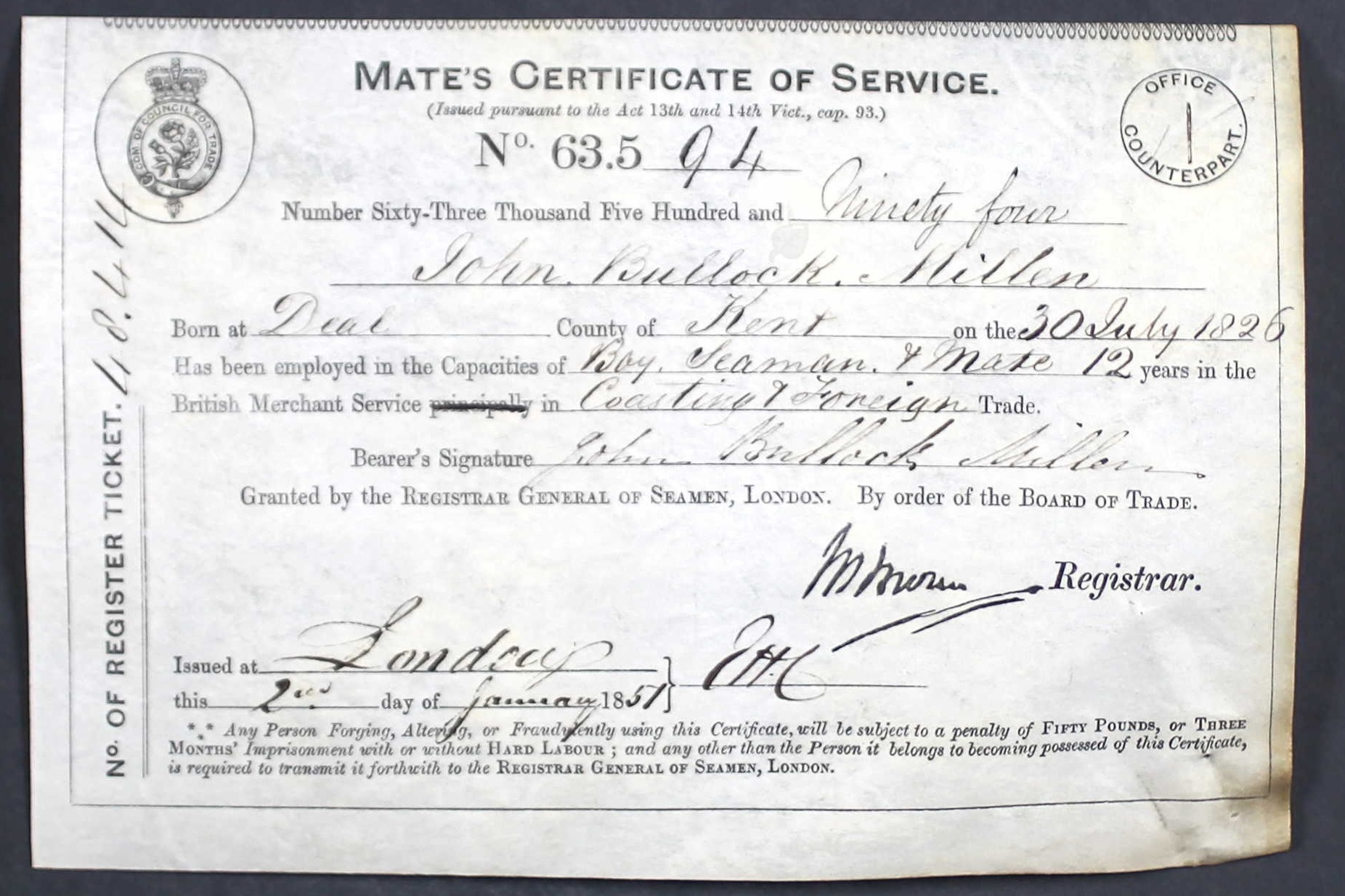
John Bullock MILLEN’s ‘Mate’s Certificate of Service’ UK and Ireland, Masters and Mates Certificates, 1850-1927, Courtesy of Ancestry.com.au
Edward’s father, John Bullock MILLEN was a Pilot of the Cinque Ports, by trade. A ‘pilot’ here being the name of an old occupation, in which the holder ‘steered ships or boats’.[1] John MILLEN’s ‘Mate’s Certificate of Service’ dated 2 January 1851, states that he had been employed in the capacities of Boy, Seaman, & Mate for 12 years in the British Merchant Service in Coasting & Foreign trade. The early years of Edward’s life were thus firmly tied to the sea and trade, with his paternal grandfather, Charles MILLEN (1790-1869) also working as a Pilot of the Cinque Ports[2] and later a Warden of the same.
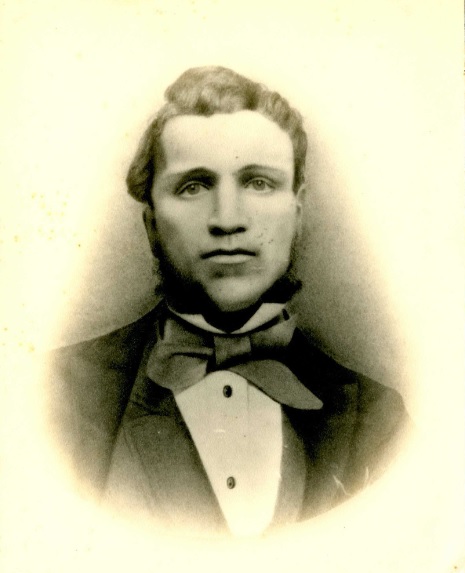
Charles MILLEN (1790-1869), paternal grandfather of Edward Davis Millen Courtesy of John Kevin Broad and Ancestry.com.au
Interestingly the motto of the town of Deal, where Edward was born, is “Adjuvate Advenas”[3] meaning “Befriend the Stranger”. Deal was a very busy port during the time of the sailing ship as the port offered a place for ships to wait safely till the winds changed and they could continue their journey onto London. However, a lot of ships were also wrecked along the coastline and there was a long history of visitors to the little town, be they weary ocean going travellers or merchant seamen trading their goods. There would have been a strong sense in the community of the town’s motto “Befriend a Stranger”. The work that Edward would do in his life especially later when he became Australia’s first Minister for Repatriation, strongly reflects this motto and the ethic of his birthplace, for he was known by returning soldiers across the country as a ‘friend’.[4]
Migrating to Australia
Records show that Edward was working in marine insurance in England until around 1880 when at the age of around 20 years[5], he immigrated to New South Wales[6]. As far as is known, Edward came alone, but his older brother Ernest Charles MILLEN, would later follow in his brother’s footsteps and moved to New South Wales in 1882.
Love and Marriage
Upon arriving in New South Wales, Edward decided to try his luck on the land and worked as a station hand around Walgett, where he met Constance Evelyn FLANAGAN. Edward and Evelyn married in Bourke on 19 February 1883[7]. The couple took up the lease of a property named ‘Mapoga’, which was situated along Cato Creek, some ten km from Brewarrina.
On the 6 June 1884 the Millen’s were blessed with the birth of a son they named Edward Eugene MILLEN, but sadly he lived only 3 weeks, dying on the 27 June 1884.
A Grazier and Land Agent in Bourke and Brewarrina
Edward ran horses and sheep on his property and his registered stock brand[8] that could be used on either horses or cattle was an upside-down capital letter “Q”. This is curious as most stock brands consist of initials of the property owner, or even the first few letters of their property name, however it seems at the present time a mystery lost to the pages of history, as to why Edward chose the letter “Q” for his brand.

Extract from ‘First Quarterly List of Horse and Cattle Brands for 1884’ in the Supplement to the New South Wales Government Gazette, showing the registered stock brand owned by Edward. Courtesy of Ancestry.com[9]
By 1887, Edward also had property and interests in Bourke. He was a very astute businessman who invested in and actively promoted schemes that would benefit the local community, such as the ‘Bourke Chilled Meat Supply and Export Company Limited’[10], that aimed to assist the local graziers of Bourke and surrounding districts to better compete with the meat markets of Sydney. It was around this time that Edward would get his first taste of politics as “he was nominated as a delegate to be sent to Sydney to petition the Minister for Works for a railway line and bridges on the back creeks.”[11]
During the late 1890s Edward had “set up as a land, mining and financial agent; by 1902 he had an office in O’Connell Street, Sydney, and a house at Burwood.”[12] Edward would spend a fair amount of time travelling between his properties around Bourke and Brewarrina and also to Sydney and Melbourne following Federation in 1901. He was however a man committed to the betterment of Australia and creating opportunities for others to grow and succeed so travel did not faze him.
Newspaper career
During his time in Bourke, Edward worked for a local newspaper, by 1887 he had established, and edited the Western Herald and Darling River Advocate.
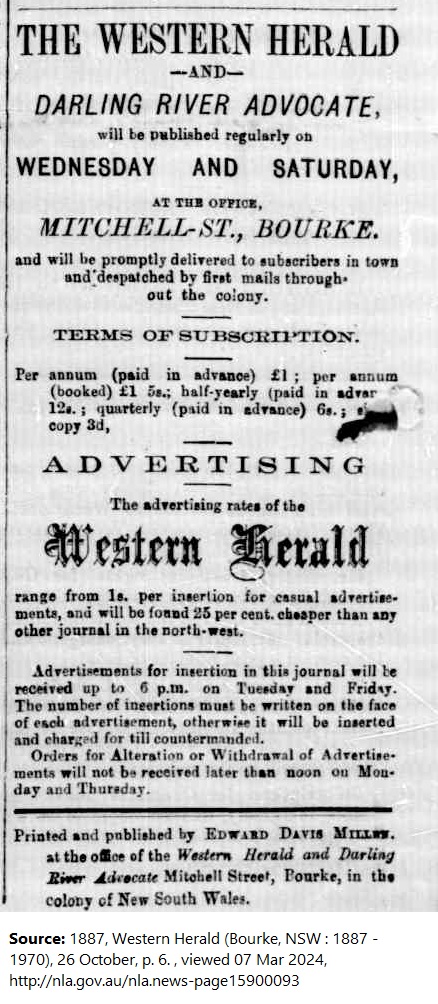
Flood
In true Dorothea Mackellar style[13], the “flooding rains” poured down in Queensland in 1890 and in April, New South Wales was being barraged with rain and the rivers were filling and flooding fast. Edward’s property Mapoga was situated along the banks of Cato Creek, a tributary of the Darling River. The Barwon River’s banks were gushing as it flowed into the Darling River between Bourke and Brewarrina. “The Darling River is 1,472 km long but when including its tributaries, stretches to 2,844 km. It drains all of New South Wales west of the Great Dividing Range. And when it floods the pain is felt everywhere. …Bourke’s hospital and jail were cleared. Women and children were packed onto trains and sent to safety while the rails were still intact. Bourke’s steamer was busy shunting people to higher ground. Horrified residents watched as sheep, cattle and horses floated past the town from the cataclysm upriver.”[14] With the rising of the Darling River, so its tributary, Cato Creek burst its banks also causing a large loss of property and livestock, but thankfully no loss of life. Edward and Evelyn were however to have a close call in the floods of 1890, and no doubt the memory of their waterlogged adventure would have stayed with them for a very long time. A newspaper of the time reported the story:
“Reports are to hand of terrible suffering and loss of stock at Brewarrina. The following is the latest:- The river has now fallen 16in., but the water is still in the main street. Business is being resumed at the banks and stores and comparatively speaking little damage has been done to the town itself. There has been a gratifying immunity from serious or fatal accidents. From reports to hand, however, there have been very heavy losses of stock and damage to property in the immediate vicinity. On the 17th inst. [April 1890] A report reached here that the Aboriginal mission station, 10 miles above Brewarrina, was in danger, A volunteer rescue party at once started, reaching there the same day, finding the station surrounded by water, but the inmates were safe. Next day the boat proceeded across country to the Cato [Creek], and visited the homesteads of Messrs. Thomas Richards, William Shearer, and E. D. Millen, all of which they found apparently recently deserted and the water running through the premises. At Shearer’s place they saw several hundred sheep which had been drowned. The party then proceed to the homestead of Mr George Harden, where they found Mr. and Mrs Millen and another lady, together with a station hand, who had arrived there a short time before. This party made a start from Mapoga on a raft, built with planking on two iron tanks, on Thursday evening, the 17th inst., at 4 o’clock intending to get down stream as far as Harden’s selection, a distance of some four miles. When they had proceeded some distance they were overtaken by night, and as they did not consider it safe to go on in the darkness they made the raft fast on a tree, remaining there till morning, when they made another start and landed on a small island, from whence Mr Millen made his way through the water to Harden’s selection, procured a buggy and pair of horses and returned for the rest of the party. He took them down to Harden’s selection, reaching there at about 9 p.m. on the 18th, after 30 hours’ exposure. The ladies of the party, together with Mrs. George Harden, jun., were brought to town next day by a boat sent out for that purpose. Mr Millen is a heavy loser by the flood, as about 2000 ewes, together with their lambs, were drowned.”[15]
Edward no doubt thanked the skills he would have learnt in his early childhood years growing up in Deal, Kent and through his strong familial ties to the sea. It is imagined that Edward went quite calmly mid the danger of the rising flood waters to strap planking across two tanks and creating a raft to facilitate escape.
But life on the land goes on, and the seasons turn, thankfully Edward and his family were able to continue working and living on Mapoga.
Advertising in Edward’s own newspaper in late September of 1890, roughly five months after the floods, shows that life on Mapoga must have been returning to normal with signs of a new business in horse breeding being attempted.
Edward and Evelyn were blessed with the births of two more children, daughters, Jessie in 1891 and Ruby in 1893. These two children would grow up to marry and have two children each, making a total of four grandchildren for the Millen’s.
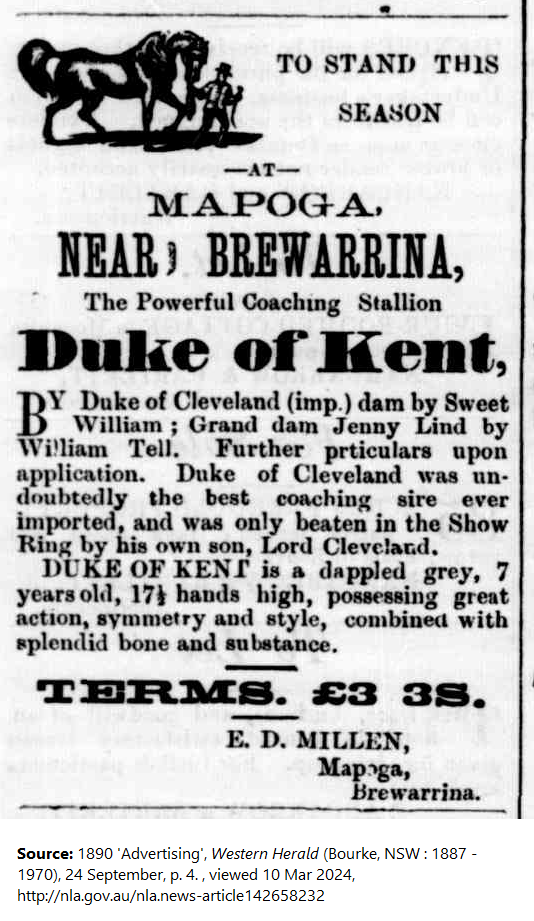
Political Career
Edward began a long career of public service across many roles when he came to Australia, the following list provides some detail of them:
- 1885, 12 January – appointed Coroner at Brewarrina, New South Wales, and for the Colony generally.[16]
- 1891 – Stood for election in the New South Wales Legislative Assembly in the seat of Bourke but lost.
- 1894 - Elected to the New South Wales Legislative Assembly in the seat of Bourke.
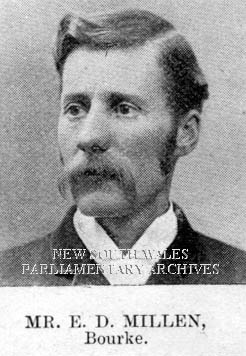
- 1894-1898 – Held the seat of Bourke in the Legislative Assembly.
- 1899, 8 April – Nominated to the New South Wales Legislative Council
- 1901 – Resigned his seat in the Legislative Council
- 1901, 14 May – 1923, 21 September - Elected to the first Commonwealth Parliament as a Senator for New South Wales. A position he held until his death in September 1923.
- 1907 – Appointed Leader of the Opposition in the Senate
- 1909, June – 1910, April – Vice-President of the Executive Council
- 1910 – 1913 – Leader of the Opposition in the Senate
- 1913, June – 1914, September – Minister for Defence
- 1914, September – 1917, February – Leader of the Opposition in the Senate
- 1917, February – November – Vice-President of the Executive Council
- 1917, September – 1923, February – Minister of State for Repatriation
- 1919 – Acting Prime Minister
- 1920 – Represented Australia at the Assembly of the League of Nations in Geneva
By far the greatest achievement of Edward in his political career would have to be his commitment to repatriating the Australian Soldier.
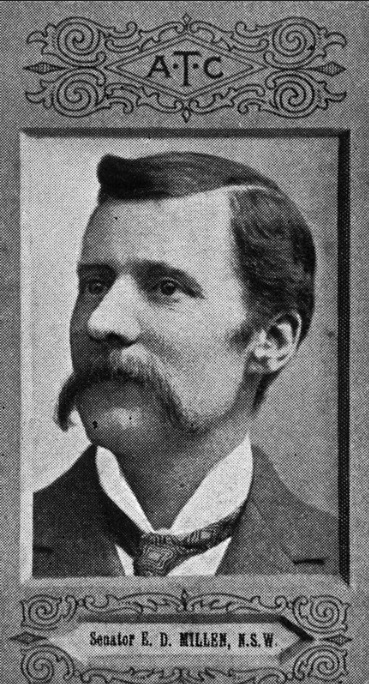
Senator E. D. Millen, N.S.W. c. 1910. Courtesy of the State Library of Queensland
Friend to Soldiers
The government body that is now responsible for the care of returned servicemen and women, widows, and orphans, is known as the Department of Veterans’ Affairs, but when it began on the 8 April 1918, it was known as the Repatriation Department, and Senator, the Honourable Edward Davis Millen was the first Minister of Repatriation.
Prior to World War I there were no consolidated Australia wide program that could care for or fund the repatriation of her soldiers. There were many voluntary patriotic organisations and local communities that did their best to raise funds at the local level to support returning soldiers, but these could in no way meet the requirements of those returning from service in World War I.
Whilst Minister for Defence in 1914, Edward proposed that a scheme should be established which would allow for government-funded war pensions[17]. It wasn’t until May 1916 however, when the Australian Soldiers’ Repatriation Fund Act 1917 was passed, which helped in some small way, but there was still a lack of a centralised body to facilitate the work that needed to be done across the country. In April 1917 Edward proposed a new bill, which passed and became the Australian Soldiers’ Repatriation Act 1917. Edward became the Minister for Repatriation, and Australia was well underway to providing a comprehensive scheme that would allow for all returning soldiers to be assisted and cared for in their return to civilian life. It would not be an easy load to carry, but Edward carried it well and whilst he had not served himself, he undertook the role of Minister for Repatriation in the true spirit of the Australian Digger, he worked with dogged determination and patriotism.
Edward outlined his scheme for the repatriation of Australia’s soldiers many times, but the second reading speech of the bill in the Senate on 18 July 1917, gives a very good summary, of which the following is part:
“Repatriation, as we understand it, is an entirely new proposition, and, seeing that war is as old as humanity itself, it is perhaps strange that this so. But, though it has been said that the war is in some sense a failure of civilisation, we can yet see through it some of the triumphs of peace. The conception of repatriation as a national obligation reveals a new conception of public duty. When we remember that, and when we also recollect the splendid efforts which have been made to carry comforts to our troops and aid to the wounded – efforts going right up to the fighting line – we shall see that through this war is being revealed that humane and civilising process which quietly and unostentatiously, but nevertheless surely, marked that long peace which was so rudely broken in August 1914. Now, although much unrelated private effort has been made in many of the Allied countries, it is unquestionably true that up to the present no comprehensive scheme for the repatriation of returned soldiers has yet been submitted by any Government anywhere. Australia has on more than one occasion given a lead to the world. It may perhaps be regarded as a cause of satisfaction that it is doing so in connection with the repatriation of its soldiers.
“It is first of all necessary to arrive at a clear conception of what we mean when we use the word ‘repatriation’. Very many sincere and emphatic promises have been made to our troops, but they have been vague and indefinite to a degree. These, perhaps, expressed the state of our feelings rather than a clear line of action. It is necessary, therefore, that we should plainly set out what it is that we contemplate and what it is that we intend. In my view – and I venture the opinion in all humility – when we speak of repatriation we mean an organised effort on the part of the community to look after those who have suffered either from wounds or illness as the result of the war, and who stand in need of such care and attention. We mean that there should be a sympathetic effort to reinstate in civil life all those who are capable of such reinstatement. That is what we intend when we use the word ‘repatriation’. The nation put forward an organised effort to enroll [sic] these men in the ranks of the fighting army, and there must be an equally organised effort to secure their return to that civil life which at the call of duty they temporarily abandoned….I present them [the proposals of the bill] too, in the hope that they will be received as an earnest attempt to meet the nation’s obligations to those who on its behalf have gone down into the Valley of the Shadow of Death, and that they may be regarded as not altogether unworthy either of Australia or of those who heroically fought and suffered in its defence.”[18]
In this the second reading of the Repatriation Bill in the Senate on 18 July 1917, Senator Millen was unsurprisingly asked, by Senator Gardiner, “What about financing the scheme?” Senator Millen replied “I tell the Senate quite candidly that I am not at this juncture concerned about finance. I have put before honorable [sic] senators a proposition representing the duty we owe to these returned soldiers, and whether it is going to cost more or less for the discharge of that duty, we have to shoulder it.”[19]
The cost of Repatriation would go on to be a point of ongoing and heated debate both in Parliament and in the press, with much criticism laid at Edward’s door, but he never once allowed himself to dwell too long on negativity and the lack of perception of others but instead he chose to focus on the facts that more and more returned soldiers were re-entering the workforce each month and more and more were being trained. The Albany Advertiser (WA) reported in the 10 December 1919 edition that “Speaking on problems of repatriation in New South Wales, last week the Minister for Repatriation (Senator Millen) stated that a tremendous effort was being made by the opposition to pose as the friends of the soldiers. The Minister said the Labor Party were indulging in a lot of loose criticism regarding repatriation. Mr. Ryan charged that too little money had been spent. Repatriation, however, was not to be judged by the amount spent, but by the results achieved. It was not an institution for the mere scattering of money. In spite of the publicity given to complaints and errors he claimed that the department had done its work with a great measure of success. It was conceivable that those who were dissatisfied would become articulate, but the much larger number having no complaint, were silent. The country did not appear to recognise that if there was yet much to do, the back of the repatriation problem had been broken. Already 250,000 men had been returned to Australia, leaving only 13,000 yet to arrive, and 116,000 had reached these shores during the last six months – an average of 4,451 per week. Yet there were on the books of the department to-day, awaiting employment, only between 13,000 and 14,000 men, or equivalent to the average number returning ever three weeks. During the last six months this represented 7 per cent, which he claimed as a moderate percentage. …Provision had been made for technical training up to 20,000 men. Instruction was being given in 164 trades. Not only would this training be of great benefit to the men themselves, but he thought it was an asset to Australia to have 20,000 skilled men where previously there were 20,000 unskilled.”[20]

Edward Millen with members of the Repatriation Committee, first meeting May 1920. Courtesy of the Australian War Memorial.
Edward Millen House
A beautiful stately building with iron-lace balustrading, and impressive tower room, rests amongst lush parklands reminiscent of the rolling green country manor grounds of England. In this setting, at the corner of Albany Highway and Hill View Terrace, East Victoria Park, sits a two-story building. The impressive Federation Queen Anne styled edifice is both a beloved local treasure and a building of high importance in the marking of Western Australia’s place in the history of health and medical care in Australia. The building of which we describe is that which was built in 1912 and opened as The Rotunda Maternity Hospital.
Elizabeth Baillie, a local midwife who was already practicing in Victoria Park purchased the land[21] for £690 in 1911, and proceeded to build the building we know today, basing it on the famed Rotunda Maternity Hospital of Dublin, Ireland. At the time the hospital was built, it was common for women to have home births, the establishment of the Rotunda Maternity Hospital changed this, and did so four years before the establishment of King Edward Memorial Hospital in Subiaco which would become Western Australia’s first public hospital for women.
In 1919 the world was reeling from the repercussions of war when the Spanish Flu, an influenza pandemic, struck. On the 7 June 1919, the State Government took over the Rotunda Maternity Hospital for the treatment of influenza patients, with the Perth Public Hospital managing the facility. It is known that 186 patients were treated for influenza at the Rotunda, “with an average stay of 13 to 22 days, and of whom 170 were discharged and 16 died. It has not been possible to establish whether the place returned to use as a maternity hospital after it was closed to influenza cases”.[22]
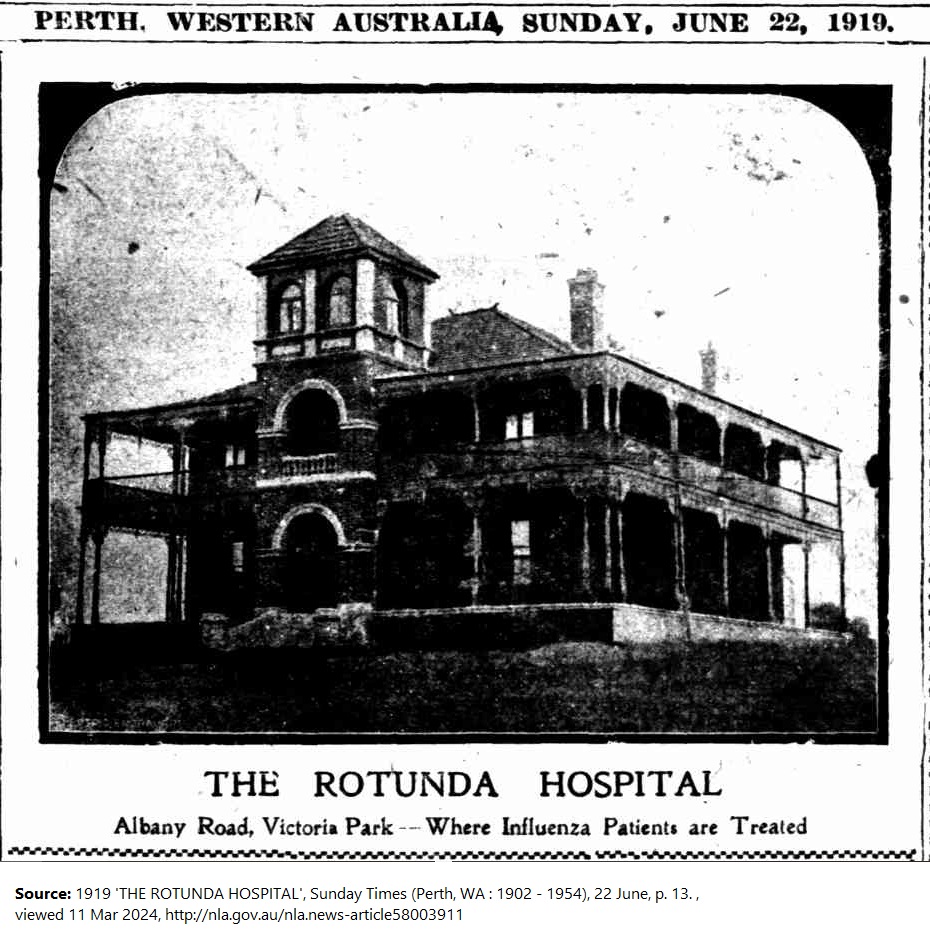
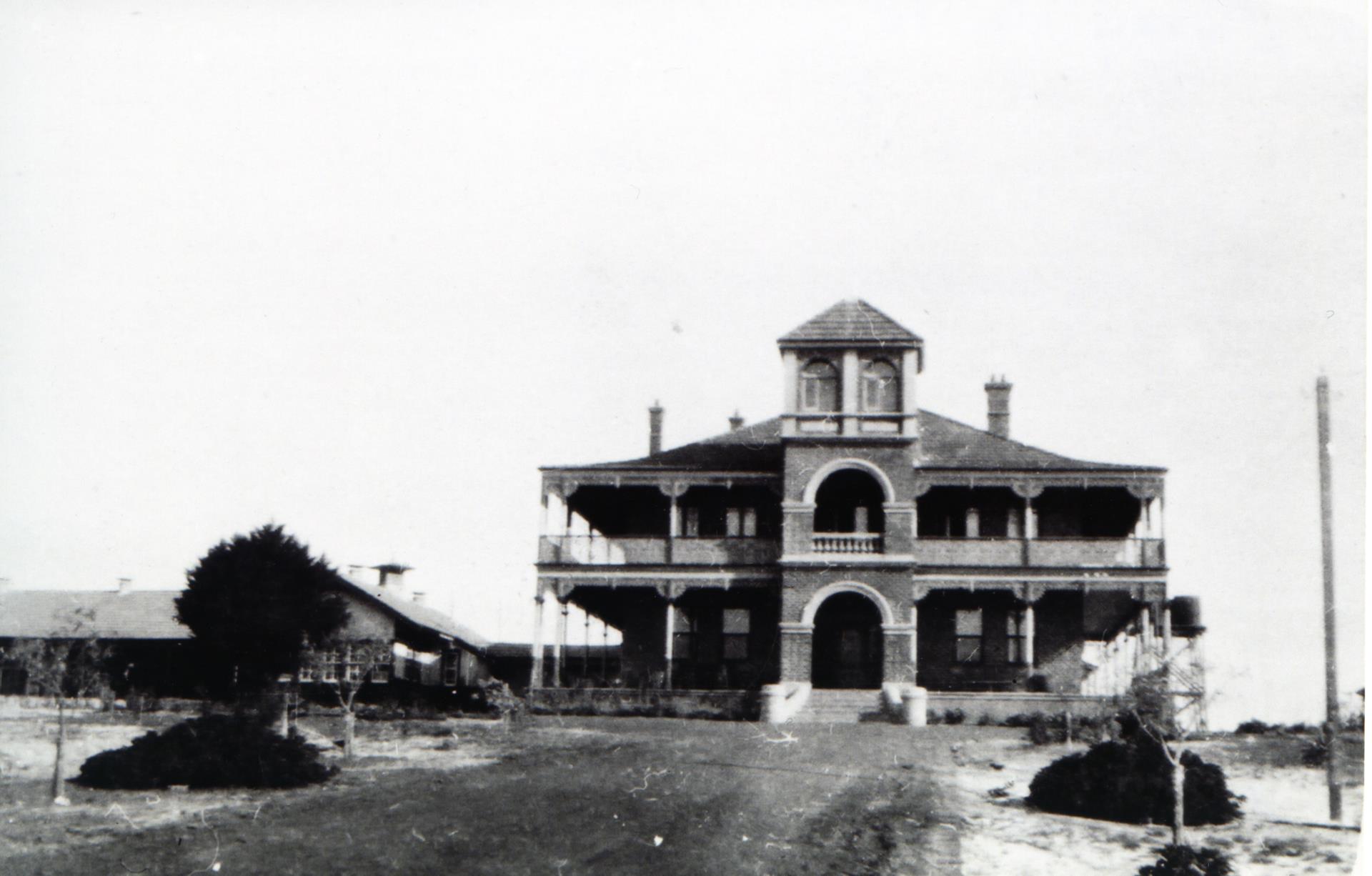
Edward Millen Home, circa 1940. Local History Collection, Town of Victoria Park Library Service.
Visiting Western Australia
Edward had twice had to cancel planned visits to Western Australia due once to having to “undertake the reins of government, during the illness of the Acting Prime Minister (Mr Watt). On the second occasion, the Minister had all arrangements perfected for the purpose of visiting Western Australia, and addressing local committees, but was delayed at the eleventh hour, owing to the outbreak of pneumonic influenza, and the consequent quarantine restrictions.”[23] The long-awaited visit by Senator, the Honourable Edward Davis Millen, Minister for Repatriation took place in March of 1919. He was greeted with enthusiasm upon his arrival by the ship ‘Somali’ in Fremantle on the 12 March 1919. Edward’s visit to Western Australia took place over 13 days, and according to ‘Repatriation’, the official journal of the Department, the “Minister was able to meet representatives of the various Government and local bodies who are directly and indirectly interested in the work of Repatriation, and through the agency of deputation, personal interview, and public gatherings, a number of which the Minister addressed, he was able to accomplish a great amount of useful work”.[24]
A full itinerary is not recorded but some of the places he visited included Northam, Bunbury, Perth, Kalamunda, Boulder and Kalgoorlie. It is not yet known whether he visited Victoria Park or saw the Rotunda Hospital (as it was by then known).

Edward praised the efforts of Western Australians and their work to embrace and guide returning soldiers back into civilian life. The Western Argus (a Kalgoorlie paper) reported of Edward’s visit there a speech he gave in thanks to the Mayor of Kalgoorlie for the warm welcome. “For some time it had been his [Edward Millen’s] desire to come to Western Australia, to come face to face with the people of this loyal State, and to find out where the Repatriation Scheme was running stiffly. As a result of his short stay he was confident that if all the States of the Commonwealth were like the West, there would be no “problem” of repatriation. The people here were showing in their after-war efforts the same loyal spirit which had been so marked during the war.”[25]
In early 1920, the Rotunda Hospital was compulsorily acquired by the Commonwealth Government to assist in the care of 16 returned soldiers who were suffering from chronic tuberculosis. The Rotunda’s then relative isolation and space for patients to walk and rest in the abundance of clean air were highly prized features of the hospital. By later the same year, local newspapers were reporting the buildings name had been changed:
“DEPARTMENT OF REPATRIATION – EDWARD MILLEN HOME. The Rotunda Hospital in Victoria Park East was purchased some months ago by the Repatriation Department for medical purposes, but the name of the institution was considered in appropriate. The Repatriation Commission, therefore, approached Senator E. D. Millen, Minister for Repatriation, with the request that this property should be called the Edward Millen Home. To this request the Minister acquiesced, so that in future the property will be known under that name.”[26]

The building, a jewel in Victoria Park’s landscape was originally situated in a garden of sand, causing it to be sometimes described as a “mansion in a desert”[26] but in 1921 the Superintendent of Kings Park was put in charge of the planting of trees and gardens that would establish a welcoming environment for patients to wander, recover and enjoy while they convalesced. The verdant park land and mature trees that line the driveway to Edward Millen Home are testament today to the hard work of the gardeners over the years, and provide much joy to the eye of the beholder as they wander the grounds of the house.
Edward Millen Home would care for returned soldiers up until 1960 when all patients were transferred to the Repatriation Hospital at Hollywood. Following this time, it remained in use for other areas of medical care whilst still being owned by the Repatriation Department. That is until ownership was transferred to the West Australian Government Department of Health in 1982, when its name was changed again to ‘Hillview Terrace Clinic’.
The site was transferred to the Town of Victoria Park on a conditional freehold basis in 2003. The Town committed then to fund the conservation of the heritage buildings and to assume ongoing management of the site.

Mr James Delury in front of Edward Millen Home, circa 1940. Local History Collection, Town of Victoria Park Library Service.
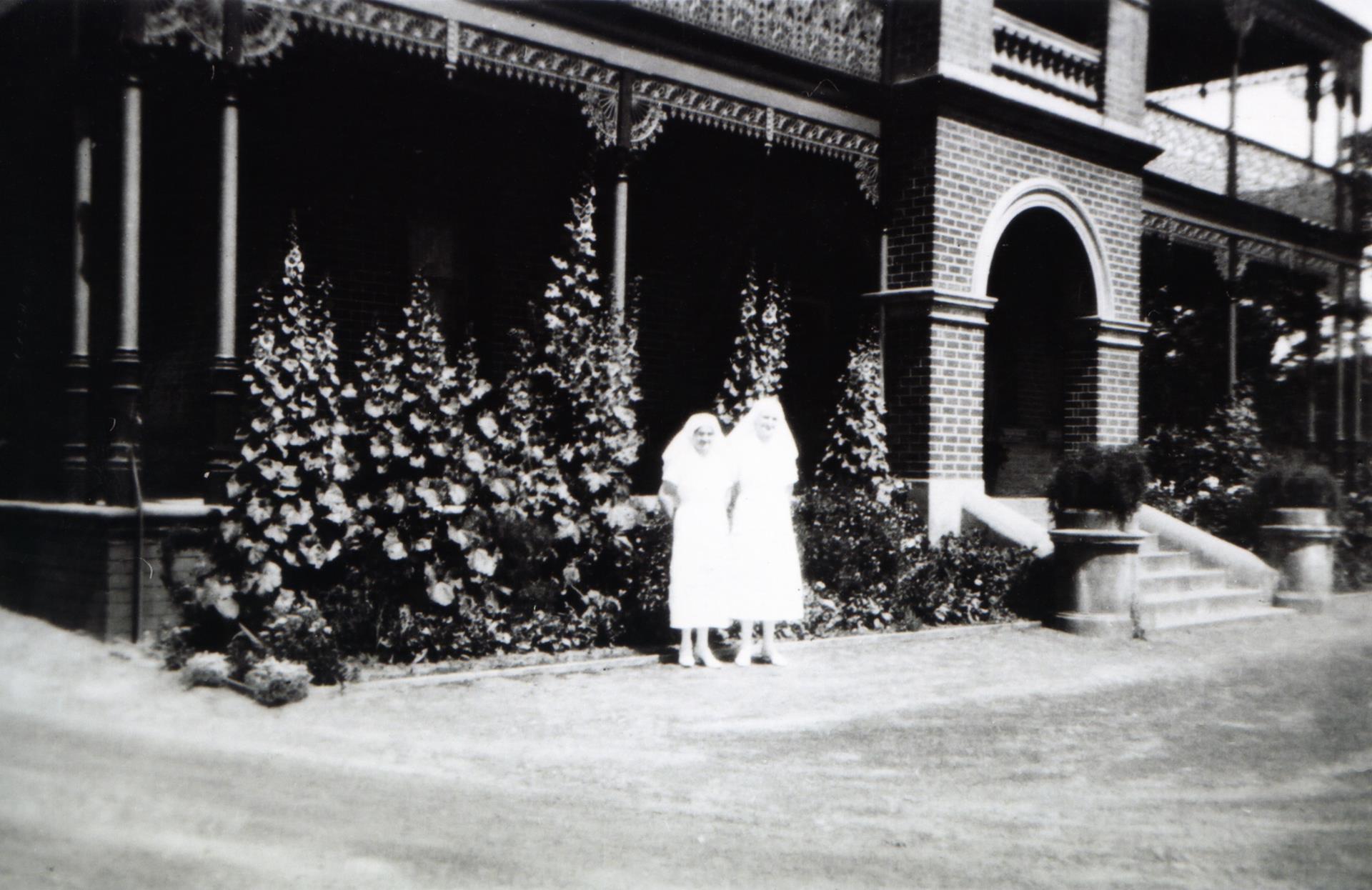
Nursing sisters in front of Edward Millen Home, circa 1940, Local History Collection, Town of Victoria Park Library Service
Edward’s Death and Legacy
In 1922, Edward’s health was suffering and by February 1923, he could no longer continue in the role of Minister of Repatriation and resigned the position. He remained a Senator until his death on 14 September 1923, dying in the home in Melbourne that he occupied when Parliament was sitting.
His death moved many people and left a big hole in the leadership fabric of Australia at the time. Former Prime Minster W. M. “Billy” Hughes was most expressive of his gratefulness for the courageous patriotism, strength, integrity and faithfulness shown by Edward in his life and work. Mr Hughes said: “ ‘Death has beckoned away another of those men who for the last quarter of a century have taken a leading part in shaping the destiny of this young Commonwealth,’ said Mr Hughes to-day. ‘Senator Millen’s death is a great loss to Australia. No man ever served it more zealously, more unselfishly. He has gone, but his life’s work remains, a monument that will, as the years roll on, speak more and more eloquently of his work.’ “[27]
Mr Hughes believed the stress and criticism laid at his feet contributed to Millen’s illness and death. He said “ ‘no man ever devoted himself to the service of his country with greater zeal than the deceased statesman. He undertook the great work of Repatriation, to which he devoted his life, and for which he gave it up. His work would live to put to shame those whose unjust criticism did so much to bring about his untimely end.”[28]
Others also praised Edward: “One of the finest statesmen Australia has ever had… He possessed exceptional ability as a debater, and a political instinct that made him an able leader.”[29]
Senator Pearce, a Western Australian Senator and the Minister for Home and Territories spoke to the house on the 26 March 1924. He asked the Senate to formally express its condolences to Edward’s wife and family and in doing so eloquently expressing his contribution to the growth and prosperity of Australia:
“The late honorable senator, as we all remember, was a keen fighter, but he was always a chivalrous opponent. He was a good Australian, with an Empire outlook…but everyone will agree that his great, his outstanding work, was the repatriation of our soldiers. He founded the Repatriation Department. Few members of the public realize the tremendous difficulties that he encountered in that undertaking. In the first place, unlike other Government Departments, it was an entirely new service. The work was wholly new to Australia. There was no precedent in Federal or State administration to guide him. Secondly, in accordance with the sentiment of the time and the general feeling both in Parliament and outside it, the Department was staffed, not as other Departments are with officers experienced in administrative work, but, in both the Repatriation and the War Service Homes Branch, with returned soldiers, the greater part of whom had no experience in the administration of Government or public Departments. Upon the late honorable senator was cast the burden of founding a new and great Department, of commencing the work without any precedent to guide him, and of carrying it on with officers who had had no previous experience in governmental administration. I well remember the words that Senator E. D. Millen used when he was asked to undertake this work: ‘I realize; he said, ‘what I am undertaking. This work will kill me, either politically or physically.’ These words were, indeed, a prophecy.
“The work accomplished by the deceased gentleman will stand for ever as a monument to him. I say without fear of successful challenge that no other country has so successfully repatriated its soldiers as has Australia; no country has done so much for its returned men. The difficulties of that conversion from a state of war to a state of peace cannot be over-stated. It was a gigantic task for a young country like this to bring back its men from scenes of war and carnage and re-establish them in civil life; and when we look back and remember that this had to be done during that troubled reconstruction period which, in every country, caused immense dislocation, and opened up new and difficult problems of Government, we must realise that the late honorable[sic] senator grappled with his task in a way that has built for him an enduring monument. As in all such cases, he had to bear criticism while he was engaged in this momentous work. He was fearless of criticism. He never wilted under it; but some of the criticism to which he was subjected, particularly by certain section of the press, was most unfair and ungenerous. It bit deeply into his soul, and those who were nearest to him knew, as I knew, that it did much to shorten his life. Under the strain and stress of what he regarded as unfair and ungenerous criticism, accompanied often by the imputation of base motives, he struggled on, moved by the highest promptings to do his very best. I know he felt that criticism. I know that it did much to weaken his effort, and to embarrass him, and it did much to undermine his health, both physically and mentally. He endured a tremendous strain in carrying out his work, and the least that could have been expected of his critics was that their criticism, at such a time and in such circumstances, would be generous and helpful. At a certain period of his Ministerial life, when a change was made in the Government, he knew that his physical strength was ebbing, and that to retain office would be to endanger his life and preclude any chance of a recovery of health. He considered then the advisability of retiring, but the one thing, and one thing only, that prevented him from leaving office was the thought that his ungenerous critics would say that his retirement was a confession of failure and a justification of their criticism. This feeling alone induced him to retain office and fight on with failing health and strength to consummate the work he had begun.
“I feel keenly the loss of the late honorable[sic] senator, because of the long personal association I had with him. He was a colleague of mine in this Chamber from its inception. We were not always on the same side. We were very often in political conflict, but we were always personal friends, and none of the fighting that took place ever left a sting. It can truthfully be said of the deceased gentleman that his whole life was spent in the service of his country, and the greater part of that life was given while he was a Minister, in the time of Australia’s greatest peril and crisis. Australia has lost a good citizen and a statesman, and this Parliament has lost one of the keenest intellects it ever possessed. Of the loss to his widow and family we cannot speak, but it must be great. All we can do is to extend to them our sympathy and condolence. Another great intellect in this Parliament has passed away; another life, packed full of usefulness and active service, has been shortened by the stress and strain of political exigency.”[31]
“A FRIEND OF THE SOLDIERS. - Perth, September 16. [1923]. The Minister of Defence (Mr. E. K. Bowden), speaking at the National Rifle Association smoke social, expressed great regret and sorrow at the death of Senator Millen. The repatriation scheme stood as a monument to Senator Millen's clear vision and unbounded enthusiasm in the cause of the returned soldier. Many mistakes had been made, but they could not be laid at his door and were the result of departmental errors. The Australian scheme of repatriation was the most comprehensive in the world, and Australia had done more for the returned soldier than any other country. Senator Millen had no precedent to guide him and the scheme was purely the outcome of his own labors [sic], and as a result of his untiring efforts he had broken down in health.”[32] Perhaps it could be said, if indulgence may be given for any perceived romantic views, that Edward had in common with the soldiers he fought so hard for, the desire to give one’s all in service for the betterment of his country.
Edward Millen House remains to this day as a steady reminder of a time past when Australia answered the call to arms and then also in peace answered the call to embrace her heroes back home to civilian life.
Senator, the Honourable Edward Davis Millen left behind his wife, Evelyn, two daughters and their families, including four grandchildren: Moya, Reginald, Ruby and Ronald.

Footnotes
[1] Hewitt, Jane and Hewitt, Paul Jack 2009, ‘Dictionary of Old Occupations’, Family Researcher, accessed online 06/03/2024, https://www.familyresearcher.co.uk/glossary/Dictionary-of-Old-Occupations-Index.html
[2] Deal is a coastal town in Kent and is member of the Cinque Ports, “a confederation of historical ports which, for hundreds of years, provided ships and sailors to defend England’s coast against invaders in return for special privileges from the Crown.” (https://cinqueports.org/). The word ‘Cinque’ is French for ‘Five’ and refers to the original five towns who were members of the confederation. They were also the closest ports to France.
[3] ‘Deal’, The Cinque Ports, website, https://cinqueports.org/deal/, accessed 7 March 2024. And Deal Town Council, Deal Town Council, website, https://www.deal.gov.au , accessed 7 March 2024.
[4] 1923 'A FRIEND OF THE SOLDIERS.', The Advertiser (Adelaide, SA : 1889 - 1931), 17 September, p. 12. , viewed 09 Mar 2024, http://nla.gov.au/nla.news-article37206496
[5] Edward’s birthday being later in the year makes it possible that he may have travelled to New South Wales at only 19 years of age.
[6] Payton, Philip 2018, Repat’ : A Concise History of Repatriation in Australia, Department of Veteran’s Affairs, Canberra, p. 24.
[7] Rutledge, Martha 1986, 'Millen, Edward Davis (1860–1923)', Australian Dictionary of Biography, National Centre of Biography, Australian National University, https://adb.anu.edu.au/biography/millen-edward-davis-7577/text13227, published first in hardcopy 1986, accessed online 10 March 2024.
[8] New South Wales Government 1884, ‘First Quarterly List of Horse and Cattle Brands for 1884’ in the Supplement to the New South Wales Government Gazette, No. 337, 10 July 1884, p. 4665, Accessed online via Ancestry.com.au.
[9] Ibid.
[10] 1890 'Advertising', Western Herald (Bourke, NSW : 1887 - 1970), 8 October, p. 3. , viewed 10 Mar 2024, http://nla.gov.au/nla.news-article142658659
[11] Marrickville Unearthed 2019, ‘Marrickville’s First Political Giant’, Marrickville Unearthed, website accessed 10 January 2024, http://www.marrickvilleunearthed.com/2-woodcourt-st.html
[12] Rutledge, Marth 1986, op. cit.
[13] Dorothea Mackellar wrote the famous Australian patriotic poem “My Country” in 1904 (when it was originally called ‘Core of My Heart’). The poem includes the well-known lines “I love a sunburnt country, a land of sweeping plains, of ragged mountain ranges, of drought and flooding rains. I love her far horizons, I lover her jewel-sea. Her beauty and her terror- The wide brown land for me!’…” an apt and oft quoted description of the extremes of Australian weather and her wild, untamed majestic beauty.
[14] Marrickville Unearthed 2019, op. cit.
[15] 1890 'THE FLOODS ON THE DARLING.', The Daily Telegraph (Sydney, NSW : 1883 - 1930), 28 April, p. 5. , viewed 10 Mar 2024, http://nla.gov.au/nla.news-article235721712
[16] New South Wales Government 1885, NSW Government Gazette, January-March 1885, p. 398.
[17] Commonwealth Government 2011, ‘History of the Repatriation System’, in Repatriation Commission, Military Rehabilitation and Compensation Commission, Department of Veterans’ Affairs: Annual Reports 2010-2011, Department of Veterans’ Affairs, Canberra, p. 11.
[18] Millen, Edward Davis 1917, ‘Speech by the Senator The Hon. E. D. Millen, Vice-President of the Executive Council on the Australian Soldiers’ Repatriation Bill’, Parliamentary Debates, 18 July 1917, Victoria, Australia, p. 21. Accessed online from the National Library of Australia.
[19] Millen, Edward Davis 1917, op. cit.
[20] 1919 'REPATRIATION DEPARTMENT', The Albany Advertiser (WA : 1897 - 1954), 10 December, p. 4. , viewed 09 Mar 2024, http://nla.gov.au/nla.news-article70141961
[21] Canning Location 2
[22] Stephen Carrick Architects 2021, ‘Edward Millen Hospital’, in Local Heritage Survey 2021, Town of Victoria Park, Victoria Park, Western Australia, pp. 142.
[23] 1919 'REPATRIATION.', The West Australian (Perth, WA : 1879 - 1954), 12 March, p. 6. , viewed 01 Mar 2024, http://nla.gov.au/nla.news-article27598118
[24] Australian Government 1919, Repatriation, Department of Repatriation, Melbourne, Vol. 1, No. 2, 25 April 1919, p. 5. Accessed online via Trove on 10 March 2024, 1919 'REPATRIATION.', The West Australian (Perth, WA : 1879 - 1954), 12 March, p. 6. , viewed 01 Mar 2024, http://nla.gov.au/nla.news-article27598118.
[25] 1920 ‘DEPARTMENT OF REPATRIATION’, The Daily News (Perth, WA : 1882-1955), 14 October, p. 6. (THIRD EDITION), viewed 01 March 2024, http://nla.gov.au/nla.news-article79562200
[26] Bissett, Helen 2011, op. cit.
[28] 1923 'PROMINENT AUSTRALIAN', The Sun (Sydney, NSW : 1910 - 1954), 14 September, p. 11. (FINAL EXTRA), viewed 27 Feb 2024, http://nla.gov.au/nla.news-article222681093
[29] 1923 'Death of E.D. Millen.', Western Herald (Bourke, NSW : 1887 - 1970), 19 September, p. 2. , viewed 27 Feb 2024, http://nla.gov.au/nla.news-article142608039
[30] 1923 'SENATOR MILLEN DEAD.', Windsor and Richmond Gazette (NSW : 1888 - 1965), 21 September, p. 1. , viewed 11 Mar 2024, http://nla.gov.au/nla.news-article85869925
[31] Australian Government 1924, ‘Death of Senator the Honorable E. D. Millen’, Parliamentary Debates, Senate Hansard, No. 13, 1924, Wednesday, 16 March 1924, Commonwealth of Australia, Melbourne, pp. 1-3. Accessed online 01 March 2024.
[32] 1923 'A FRIEND OF THE SOLDIERS.', The Advertiser (Adelaide, SA : 1889 - 1931), 17 September, p. 12. , viewed 09 Mar 2024, http://nla.gov.au/nla.news-article37206496
Bibliography
1890 'THE FLOODS ON THE DARLING.', The Daily Telegraph (Sydney, NSW : 1883 - 1930), 28 April, p. 5. , viewed 10 Mar 2024, http://nla.gov.au/nla.news-article235721712.
1890 'Advertising', Western Herald (Bourke, NSW : 1887 - 1970), 24 September, p. 4. , viewed 10 Mar 2024, http://nla.gov.au/nla.news-article142658232.
1890 'Advertising', Western Herald (Bourke, NSW : 1887 - 1970), 8 October, p. 3. , viewed 10 Mar 2024, http://nla.gov.au/nla.news-article142658659.
1919 'REPATRIATION.', The West Australian (Perth, WA : 1879 - 1954), 12 March, p. 6. , viewed 01 Mar 2024, http://nla.gov.au/nla.news-article27598118.
1919 'SENATOR MILLEN AT BOULDER', Western Argus (Kalgoorlie, WA : 1916 - 1938), 1 April, p. 22. , viewed 01 Mar 2024, http://nla.gov.au/nla.news-article34205679.
1923 'PROMINENT AUSTRALIAN', The Sun (Sydney, NSW : 1910 - 1954), 14 September, p. 11. (FINAL EXTRA), viewed 27 Feb 2024, http://nla.gov.au/nla.news-article222681093.
1923 'Pressman and Politician.', Queensland Times (Ipswich, Qld. : 1909 - 1954), 15 September, p. 9. (DAILY.), viewed 27 Feb 2024, http://nla.gov.au/nla.news-article125408218.
1923 'SENATOR MILLEN.', Northern Star (Lismore, NSW : 1876 - 1954), 15 September, p. 4. , viewed 27 Feb 2024, http://nla.gov.au/nla.news-article93617212.
1923 'A FRIEND OF THE SOLDIERS.', The Advertiser (Adelaide, SA : 1889 - 1931), 17 September, p. 12. , viewed 09 Mar 2024, http://nla.gov.au/nla.news-article37206496.
1923 'PERSONAL', The Albany Advertiser (WA : 1897 - 1954), 19 September, p. 3. , viewed 27 Feb 2024, http://nla.gov.au/nla.news-article71828309.
1923 'Death of E.D. Millen.', Western Herald (Bourke, NSW : 1887 - 1970), 19 September, p. 2. , viewed 27 Feb 2024, http://nla.gov.au/nla.news-article142608039.
1923 'DEATH OF SENATOR MILLEN.', Western Mail (Perth, WA : 1885 - 1954), 20 September, p. 14. , viewed 27 Feb 2024, http://nla.gov.au/nla.news-article44772050.
1923 'SENATOR MILLEN DEAD.', Windsor and Richmond Gazette (NSW : 1888 - 1965), 21 September, p. 1. , viewed 11 Mar 2024, http://nla.gov.au/nla.news-article85869925.
Ancestry.com 2012, UK and Ireland, Masters and Mates Certificates, 1850-1927, Ancestry.com Operations, Inc., Provo, UT, USA.
Australian Government 1919, Repatriation, Department of Repatriation, Melbourne, Vol. 1, No. 2, 25 April 1919, p. 5. Accessed online via Trove on 10 March 2024, 1919 'REPATRIATION.', The West Australian (Perth, WA : 1879 - 1954), 12 March, p. 6. , viewed 01 Mar 2024, http://nla.gov.au/nla.news-article27598118.
Australian Government 1924, ‘Death of Senator the Honorable E. D. Millen’, Parliamentary Debates, Senate Hansard, No. 13, 1924, Wednesday, 16 March 1924, Commonwealth of Australia, Melbourne, pp. 1-3. Accessed online 01 March 2024.
Australian Government 2011, ‘History of the Repatriation System’, in Repatriation Commission, Military Rehabilitation and Compensation Commission, Department of Veterans’ Affairs: Annual Reports 2010-2011, Department of Veterans’ Affairs, Canberra, p. 11.
Australian Government , ‘Repatriation of Australians in World War I’, in Anzac Portal, Department of Veterans’ Affairs, Canberra, https://anzacportal.dva.gov.au/wars-and-missions/ww1/politics/repatriation, website, accessed online 7 Marcy, 2024.
Australia. Repatriation Commission & Australia. Department of Veterans' Affairs & Australia. National Treatment Monitoring Committee & Australia. Military Rehabilitation and Compensation Committee. 1987, Annual reports Australian Govt. Pub. Service, Canberra, A.C.T viewed 28 February 2024 http://nla.gov.au/nla.obj-799111920.
Bissett, Helen 2011, Potted History of the Rotunda Hospital (Edward Millen House), [pamphlet], Town of Victoria Park Library, Town of Victoria Park, Western Australia.
Deal Town Council, Deal Town Council Official Website, https://www.deal.gov.uk/, accessed on 7 March 2024.
Hewitt, Jane and Hewitt, Paul Jack 2009, ‘Dictionary of Old Occupations’, Family Researcher, accessed online 06/03/2024, https://www.familyresearcher.co.uk/glossary/Dictionary-of-Old-Occupations-Index.html.
Marrickville Unearthed 2019, ‘Marrickville’s First Political Giant’, Marrickville Unearthed, website accessed 10 January 2024, http://www.marrickvilleunearthed.com/2-woodcourt-st.html.
New South Wales Government 1884, ‘First Quarterly List of Horse and Cattle Brands for 1884’ in the Supplement to the New South Wales Government Gazette, No. 337, 10 July 1884, p. 4665.
New South Wales Government 1885, NSW Government Gazette, Ancestry.com.au
Payton, Philip 2018, Repat’ : A Concise History of Repatriation in Australia, Department of Veteran’s Affairs, Canberra.
Rutledge, Martha 1986, 'Millen, Edward Davis (1860–1923)', Australian Dictionary of Biography, National Centre of Biography, Australian National University, https://adb.anu.edu.au/biography/millen-edward-davis-7577/text13227, published first in hardcopy 1986, accessed online 10 March 2024.
Skardon, David, Historic Stories & Pictures of Deal Kent, website: https://davidskardon.wixsite.com/skardons-world, accessed online 7 March 2024.
Stephen Carrick Architects 2021, ‘Edward Millen Hospital’, in Local Heritage Survey 2021, Town of Victoria Park, Victoria Park, Western Australia, pp. 140-147.
